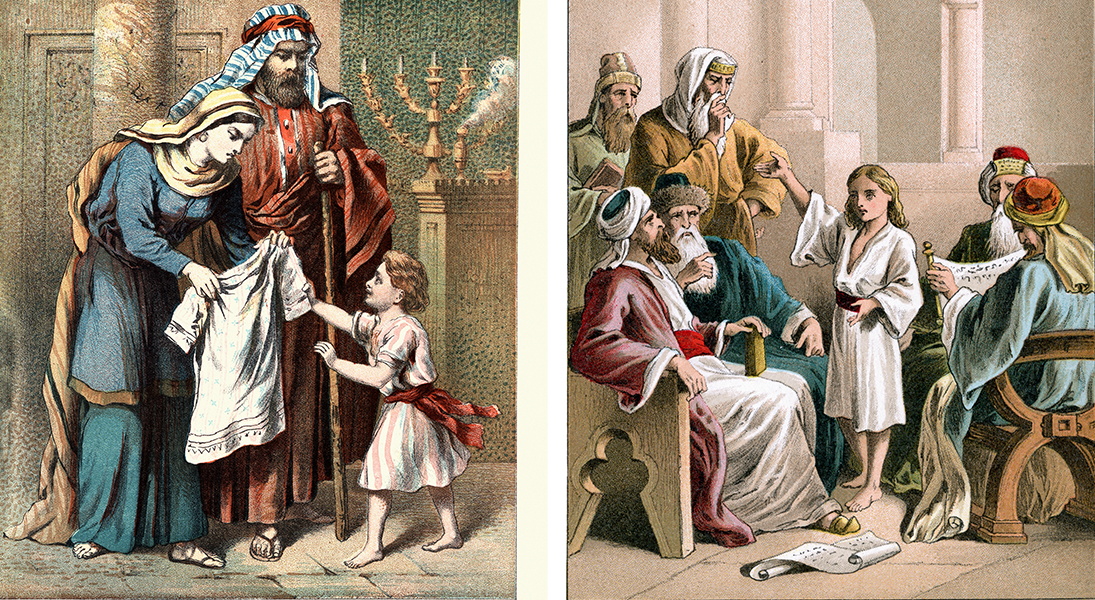Lectionary for Dec 29, 2024
First Sunday of Christmas
1 Samuel 2:18-20, 26; Psalm 148;
Colossians 3:12-17; Luke 2:41-52
My three kids are still little but are growing up quickly. One of the thrills of being a parent is watching their personalities develop. My eldest, not yet 10, has kept us in stiches for years. He loved making funny faces when he was little, and now he loves jokebooks and playing around with word meanings and sounds. His character—delighting in making other people laugh—has stayed consistent, but his humor and the methods he uses to make others laugh have changed immensely as he gets older. This week’s lectionary passages describe two little boys growing up and how their character remains consistent as they grow into the world.
A sweet little detail in 1 Samuel that often goes unnoticed is that when Hannah and Elkanah (and Peninnah and her kids) made their yearly pilgrimage to Shiloh, Samuel’s mother would make him a new little garment. Samuel grew up in the tabernacle, in service of the Lord and the people, and eventually became one of the judges and prophets of Israel. But he never forgot what his mother gave him.
First, and of most importance, she gave him the holy orientation toward God’s justice. In the books of Samuel and Kings, time after time a man rises up only to be forced to learn the lesson that Hannah taught in Chapter 2: the arrogant, prideful, powerful and rich are brought low, but the humble, hungry, childless and poor are lifted up. Samuel is the lone male ruler in the next couple books who doesn’t need to be opposed for his injustice. He got that from his mom!
Samuel also received from his mom the garment that characterizes him for the rest of his life (and even after). He wore the robe that his mom made him well into adulthood. When Saul was told that he would no longer be king because of his arrogance in assuming positions and powers that were not his, he clung to Samuel’s favorite robe, tearing it (1 Samuel 15:27). In anger, no doubt, at his mother’s loving handiwork being torn, Samuel prophesied that the kingdom would be torn from Saul and given to someone better than him. Years later when the witch of Endor called Samuel up to guide Saul, he was recognized by his beloved robe that he wore even in death (1 Samuel 28:14). The garment that Hannah had presented to Samuel was a physical manifestation of how he always clung to the moral treasures that his mother had given him.
What if we took a sabbath to ask if we are living in the world as we want to be, as our ancestors want us to be, and as God wants us to be?
Hundreds of years later, Jesus also clung to the treasures that were given by his parentage. Jesus’ family, like Samuel’s, made pilgrimages every year to the place where God’s name rested (Luke 2:41). One year Jesus didn’t join the caravan as it returned to Nazareth. He stayed in the temple, listening to the teachers and asking them questions. All who heard him were amazed at his understanding and answers. Jesus, like Samuel, clung steadfastly to what he learned from his parents, both earthly and heavenly.
When, at last, Mary and Joseph found him in the temple, Jesus assured them that he was right where he was supposed to be—in his Father’s house. Of course, worried parents would feel frustration, anger and relief, but Mary also treasured these events in her heart. Jesus continued to grow in favor with God and with humans, as he grew physically and cognitively (52).
What does this mean for us? Well, as we prepare to close 2024 and open 2025, it might be worth reflecting on who you have been this past year. Have you been operating out of the self that God has called and created you to be? Or have you been acting out of untreated anxiety and exhaustion? Would your ancestors recognize their hopes and dreams for you in your present life?
This is not to add pressure to anyone but to permit a moment of reflection. It’s easy to get trapped in the day-to-day rat race of society. What if we took a sabbath to ask if we are living in the world as we want to be, as our ancestors want us to be, and as God wants us to be? How can we “put on love” (Colossians 3:14) and wear it as a garment all the days of our lives, just as Samuel wore his mother’s robe to remind him who, and whose, he was? Let us be like Samuel and Jesus, in remembering and acting out our true calling and character.









